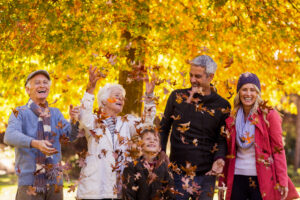02 Sep Carolina Inn: Supporting Seniors During the Fall Transition

As summer transitions into fall, the shift in weather, daylight, and daily routines can influence how older adults feel, both physically and emotionally. While the crisp air and seasonal changes can be enjoyable, fall also brings unique considerations for senior health and comfort.
In this blog, we’ll explore five key ways autumn can impact older adults, from mobility and mood to immunity and routine, and how The Carolina Inn thoughtfully adapts to support resident wellbeing throughout the season.
1. Increased Risk of Falls and Injuries
As temperatures begin to cool, wet leaves, early morning frost, and changes in footwear can all increase the risk of slips and falls, both indoors and outdoors.
According to the CDC, 1 in 3 adults over age 65 falls each year, with many of those incidents occurring during transitional seasons like fall.
For adults over 80, that number increases to 1 in 2.
Falls are the leading cause of injury-related hospitalizations among seniors, often resulting in long recovery periods or permanent mobility issues.
Supporting Stability and Comfort as Seasons Change
At The Carolina Inn, we pay close attention to how seasonal changes can affect mobility. As daylight hours shorten, we ensure all hallways, entrances, and outdoor areas remain well-lit and easy to navigate.
Our team routinely clears outdoor paths of wet leaves or moisture. We also encourage the use of supportive, non-slip shoes appropriate for cooler temperatures to help residents move safely and confidently throughout the day.
2. Joint Pain and Stiffness Due to Temperature Drops
Colder temperatures, especially in the early mornings or evenings, can trigger joint stiffness, arthritis pain, and reduced mobility.
A 2021 study published in the Journal of Rheumatology found that over 68% of older adults with arthritis report worsened symptoms during colder, damper months.
Even small drops in temperature can lead to increased inflammation and limited range of motion in older adults.
Supporting Comfort and Mobility in Cooler Weather
At The Carolina Inn, we understand that cooler temperatures can affect how residents feel physically. To help ease joint stiffness and support circulation, we offer light indoor stretching and movement opportunities throughout the day.
Our team maintains a warm, stable indoor environment and ensures residents have access to comfortable layers and inviting communal spaces where they can stay active, cozy, and engaged.
3. Mood Shifts and Early Signs of Seasonal Affective Disorder (SAD)
As daylight hours shrink, some seniors may begin to feel more fatigued, irritable, or withdrawn. While SAD is often associated with winter, symptoms can start in late fall as sunlight exposure decreases.
Approximately 5% of U.S. adults experience clinical Seasonal Affective Disorder, while 10–15% report mild seasonal mood changes.
Seniors with limited mobility or chronic illness are especially vulnerable due to reduced time outdoors and lower Vitamin D levels.
Supporting Emotional Wellbeing Through Seasonal Shifts
At The Carolina Inn, we prioritize time outdoors during midday hours when sunlight is most beneficial, and we supplement natural light with full-spectrum lighting in common areas and resident rooms. To keep spirits high and routines steady, our team curates meaningful group activities that encourage social interaction, creativity, and a sense of daily rhythm.
4. Immune System Vulnerability
The shift into fall also marks the beginning of cold and flu season, which poses increased risk for older adults with weakened immune systems.
-The CDC notes that people 65 and older account for 70–85% of flu-related deaths and 50–70% of flu-related hospitalizations each year.
-Cooler air can also dry out nasal passages, increasing susceptibility to viruses and respiratory infections.
Proactively Supporting Immune Health
As seasonal illnesses become more common in the fall, The Carolina Inn takes extra steps to safeguard residents’ health. Our Chef and her team offer a nourishing, immunity-supporting diet options. Our care staff also monitors for early signs of respiratory illness and stays in close communication with families to ensure proactive, coordinated support.
5. Routine Disruption and Social Withdrawal
Fall often brings changes to routines, shorter days, cooler weather, and fewer family visits can lead to feelings of disconnection or restlessness. Routine is crucial for older adults, especially those with cognitive impairments, and sudden changes can lead to confusion or emotional decline.
A lack of stimulation or daylight exposure can increase the risk of depression in seniors.
Maintaining Connection and Routine Through the Season
At The Carolina Inn, we recognize how important consistency and engagement are to our residents’ wellbeing, especially during seasonal transitions. We maintain steady daily routines even as more activities move indoors, with activities like Arts & Crafts, Karaoke Nights, Bingo, Chair Aerobics, and many more.
Fall Doesn’t Have to Mean Slowing Down, Just Shifting Smartly
With the right care, preparation, and intention, fall can be a season full of comfort, connection, and joy at The Carolina Inn. From cozy indoor activities to proactive wellness measures, we thoughtfully adapt every detail to help our residents feel safe, supported, and engaged, no matter the weather outside.
If you have any questions, or would like to experience firsthand how we celebrate and support our community through the seasons, we warmly invite you to schedule a visit.
We’d love to show you what thoughtful senior living looks like, especially during this beautiful time of year!


Sorry, the comment form is closed at this time.